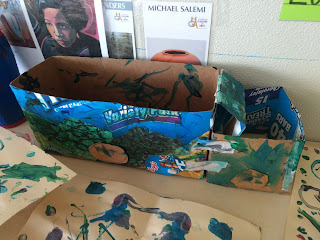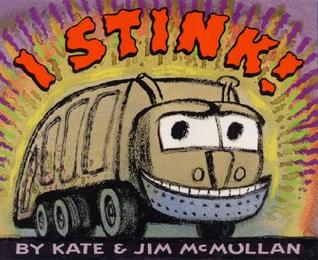It's here!
The holidays took over last week! After all, we base our lessons around children's interests.
On Friday, we sent home an activity for the parents to work on with their children. We asked them to draw a building in their neighborhood and label it. We were really hoping to get more than two, but at least two is better than nothing. Next time, I'll probably remind the parents.
In Dramatic Play, we set up a Post Office by adding a sign, a few blue shirts, a bag, and our recycled boxes. We paired it with Writing Center and by encouraging the children to write cards and stamp envelopes, then take it to the Post Office to be delivered. The students loved using the Christmas stickers and writing cards for their friends; meanwhile, the students in Dramatic Play loved looking at the packages and sorting them from the envelopes that came in.
My co-teacher worked hard putting down tape to look like a train track, then set up a cardboard box tunnel so the children could crawl through it.
The holidays took over last week! After all, we base our lessons around children's interests.
On Friday, we sent home an activity for the parents to work on with their children. We asked them to draw a building in their neighborhood and label it. We were really hoping to get more than two, but at least two is better than nothing. Next time, I'll probably remind the parents.
For our sensory table, we made cinnamon playdough. We used flour, water, and copious amounts of cinnamon, then had the children mix it together. We talked with them about the consistency and encouraged them to add more water or flour as needed. The children loved mixing it together and we were even able to keep the playdough around for a couple of days in our art center.
| The mess was totally worth it! |
I love encouraging children to use items from other centers, as long as they put it back in the right spot!
In Art Center, we incorporated some math by making candy canes. We gave them cutouts and encouraged them to make a pattern using red and white paint. For some, it was also great practice using their prewriting skills as they made short strokes from left to right and up & down.
| Who needs worksheets with fun activities like these? |
The highlight of the week was the Polar Express.
We set up chairs to look like seats on a train, then gave the children tickets that we punched when they got on the train. We served popcorn and hot chocolate, then held up the book as Liam Neeson read it to them with sound effects.
Whew! Do you have any holiday traditions in your class?
Whether your break is short or long, I hope you have a fantastic one. Relax, take some time to be happy, and look after yourself.
Happy Holidays!
--Amy






















